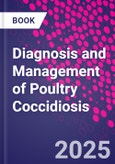Diagnosis and Management of Poultry Coccidiosis provides a comprehensive overview of current trends in the control of Eimeria and coccidiosis. Chicken coccidiosis cost the global economy $12.58 billion in 2016, including lost productivity and expenditures associated with prevention and treatment. As a result, chicken producers have developed several management approaches to combat coccidiosis. With consumer and regulatory pressure, nutritional interventions, and the need to identify anticoccidial alternatives that do not impair growth performance, this book contemplates the antibiotic-free future of the chicken industry. Initial chapters in this book introduce readers to chicken coccidiosis and the identification and diagnosis of the Eimeria parasite. Subsequent chapters describe innate and adaptive immune responses of poultry to Eimeria and delve into the purification of Eimeria lifecycle stages and in vitro culture systems for the study of Eimeria. The latter half of the book examines a variety of modern immunization measures, dietary interventions, and anticoccidial medications designed to combat coccidiosis.
Table of Contents
1. Coccidiosis 2. Population, genetic, and antigenic diversity of Eimeria 3. Eimeria parasite: Identification and diagnosis 4. Phylogenetic relationships among Eimeria spp. (Apicomplexa, Eimeriidae) 5. Coccidiosis in Chickens: Prevalence and Risk Factors 6. Coinfection 7. Purification of Eimeria life cycle stages 8. In vitro culture systems for the study of Eimeria 9. Innate immune response to Eimeria 10. Adaptive immune response to Eimeria 11. Anticoccidial drugs 12. Examining the genetics of Eimeria resistance 13. Anticoccidial live vaccines 14. Recombinant subunit vaccines 15. Nanotechnology for poultry coccidiosis control 16. Genetic manipulation of Eimiria 17. Possible ways to control chicken coccidiosis with transgenic Eimeria parasites 18. Nutritional supplements 19. Prebiotics, probiotics, biobiotics, and synbiotics 20. Phytogenics feed additives (phytobiotics or botanicals) 21. Eimeria infection and gut microbiota 22. Environmental control of coccidiosis in poultry








